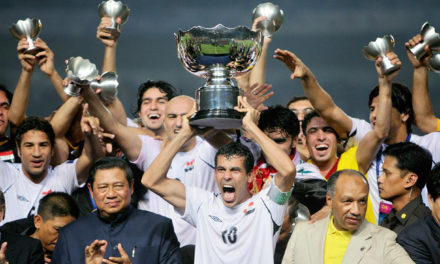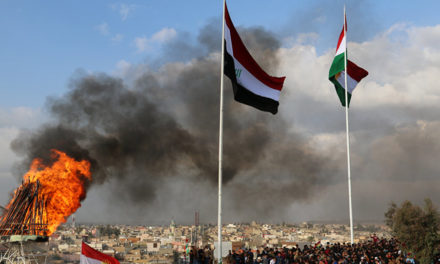Balanced news coverage and realistically optimistic analysis about Iraq remains rare. Another instance where this has become clear is how the Kuwait International Conference for Rebuilding Iraq was covered by the media. Prominent news outlets predicted even before the conclusion of the conference that it was not going to be a success. Headlines like ‘Iraq Donor Conference Heads Toward Embarrassing Failure’ started to appear, only to be changed later to a milder versions when the event was close to its end and the amount of the contributions became known.
Part of the reason for this sentiment was that the U.S. had announced beforehand that it would not offer any direct financial support. This however should have been seen in light of Trump’s policy of disengaging from direct financial aid to the MENA region, but also cutting costs elsewhere. Furthermore, during the conference the U.S. provided assistance by extending a $3 billion credit line through the Export-Import Bank of the United States.
Also, the media kept calling the event a “donor’s conference” when in reality the main goal of the conference was to attract investment. Through the Reconstruction and Investment Framework, the Iraqi government provided in detailed ways what needs to be known in order to invest in 157 medium and major projects. Therefore, the Iraqi government was not expecting to secure all the estimated $88.2 billion, the total amount of damage to areas liberated by Daesh, to rebuild the country in the first place. Nevertheless, it was able to secure about $30 billion of financial support in the form of aid, loans, and investments by the end of the conference. Doing that in one conference is significant and can have an impact if all pledges are followed through.
Looking back at how the event happened in contrast to how it was portrayed shows how important it is for the Iraqi government to engage with the media and inform the public about the real purpose of an event like this, especially as it is the media’s role in managing the expectation of the public. Given that the media was not reflecting the real purpose of the conference, the quite successful three-day event was initially being painted as an embarrassment and failure. Securing the whole amount of rebuilding a country in one conference is hardly imaginable, especially given the current situation of the global economy, but when this is actually expected, even securing (or at least being promised) a third of this huge sum is seen by the public as a disappointment.
While it is not possible to completely control how the media covers Iraq, it is very much possible to influence this coverage. Furthermore, in order for reform and reconstruction to be successful, public support is required, which not only includes local support but also the support of the global community. However, this support is affected by the public perception. Reform efforts should not be hindered or worse derailed because of some unrealistic expectations. This can happen when the government announces overambitious goals and timelines, or when the media sets the bar too high, which will make any progress look insignificant.
Hence it is important to manage expectations through a comprehensive media strategy that should support the reform effort. The government must take into account how the media can make its quest easier or harder based on how it manages its relationship with it.
Furthermore, the government should continue showing deep levels of self-reflection as it did in the Reconstruction and Investment Framework when it talked openly about the areas where it is suffering from structural failures and tried to provide assurances for donors and investors.
Goals and timelines should be chosen in realistic ways, and larger efforts should be put to inform the public about the real challenges of change and reform, which are often of political nature rather than just technical.
Despite the huge challenges and the too often negative expectations by many, there is a real chance that this conference might have kick-started the rebuilding process in the country. However, even if it turns out to be otherwise, one important factor that calls for realistic hope is that there is willingness to tackle corruption and start with the reform process, despite all the challenges ahead. Any progress achieved against corruption will improve Iraq’s environment to do business.

Muhammad Al-Waeli
Muhammad Al-Waeli is an Iraqi commentator on political and social issues. He is currently doing a PhD in Human Resource Management and is interested in politics, media, and development.










